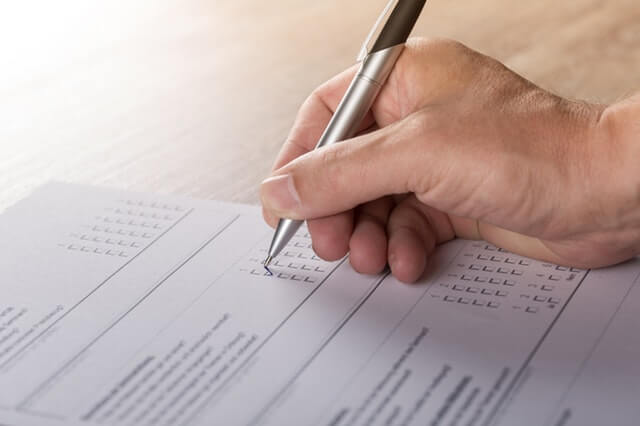Test Preparation
The Day of the Exam

The following information is essential if you are required to complete an examination in person at the University/Agency where you applied. If the classification is a Credentials Assessment examination, the following information does not apply.
Tests and test-taking constitute an important part of our everyday lives. They help us gauge the amount of knowledge we have learned in the past, understand our levels of functioning as they occur in the present, and predict our performance as we might see it in the future. Despite their universal value, however, tests have become perceived by the public as not only a "necessary evil", but also as a potential source of anxiety and worry. Listed below are just some ways in which test takers can lessen the anxiety, and likewise turn the test-taking experience into a more fulfilling one.
Plan to arrive early. Allow yourself extra time to find parking, to locate the room where you will be taking the exam, and to get yourself settled. However, you may not be allowed into the test center/room until shortly before your reporting time. Try to do something relaxing the hour before the exam — last-minute cramming will cloud your mastery of the overall concepts of the subject matter. If waiting for the exam to begin causes anxiety, distract yourself by reading a magazine or newspaper.
Monitors
There will be exam monitors in the building and room where you take the exam. The
monitors will ensure that the exams you are taking are administered fairly to all
candidates. You may be able to select your seat. If so, choose a comfortable location
for taking the exam with good lighting and minimal distractions (away from doors,
windows and people who you know who may generate anxiety and tend to upset your
stability). Depending on the examination you will take, you may be provided a System
Answer sheet (blue or pink bubble sheet) to record your examination responses, an
exam booklet in which you write your responses or a computer in which you will select
your responses electronically. Each examination setting and/or monitor will provide
you with instructions on how to complete the examination you are taking. Take the
time to listen to the monitor’s presentation and read the instructions while
you wait for the exam to begin. If you have questions, raise your hand and ask the
monitor.
Beginning the Exam
The monitor will begin the examination process. Listen to the monitor carefully.
You will be asked to verify your identification, including signing your
answer sheet or entering data if your examination is provided through the E-Test
computerized examination system. After this process is complete, the monitor may
give you some oral instructions and/or distribute exam booklets, and will tell you
when you may begin the exam.
During the Exam
- Read the directions carefully
- Focus on answering the questions, not on your overall performance
- Budget your time; Don't rush; Take your time
- Relax
- Take deep breaths
- Change positions
- Remember you are in control
- Don't think about the fear; think about the next step and keep on task, step by
step
- Use positive reinforcement for yourself: Acknowledge that you have done, and are
doing, your best
- Expect some anxiety. It's a reminder that you want to do your best and can provide
energy. Just keep it manageable
- Tell yourself, "I can be anxious later, now is the time to take the exam"
- Realize that anxiety can be a "habit" and that it takes practice to use it as a
tool to succeed
- If you go blank, skip the question and continue to the next question
- Don't worry if you cannot answer a question right away
- You will have an opportunity to review your answers and finish any questions that
remain incomplete at the end of the test
- If you're taking an essay exam and go blank on the whole exam, don't panic;
select a question and start writing. It may trigger the answer in your mind
- For multiple-choice questions, read all the options first, then eliminate the most
obvious. Unsure of the correct response? Rely on your first impression, then move
on quickly
- Don't panic when other applicants start completing their exam.
There's no reward for being the first done; they may be taking a different examination
Although exam monitors cannot answer questions about the exam itself, they can assist
you if something goes wrong, if there is a defect in your exam booklet, or if you
have to leave the room for a legitimate purpose. Just raise your hand and a monitor
will assist you. If someone or something is distracting you, bring it to the monitor's
attention. Do not look at the work of other people in the room or you may be disqualified.
Ending the Exam
If time allows, remember to check over your examination responses for those you
may have skipped or checked for review. Before you leave the test site, you must
return all the exam materials you were given, including scrap paper and any paper
materials you brought to assist you with the examination such as your resume and
transcript. Make sure you have your personal belongings (such as umbrella, coat,
purse, etc.).
Immediately after the exam, review how you did
Jot down what strategies worked and hold onto these strategies. List what did not
work and other areas for which you need improvement. Celebrate that you are on the
road to overcoming this obstacle.
Keep a positive attitude. Remember your attitude can affect how well you do on an
exam. If you know what to expect on test day, read all the exam materials
carefully, listen to the monitors, follow the directions given, and keep a positive
attitude, you will do your best.
Good Luck!